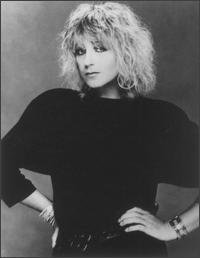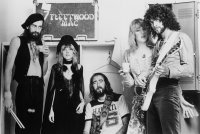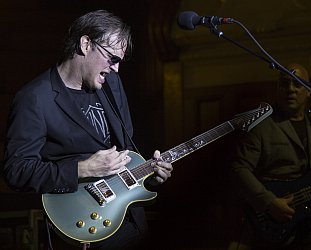Graham Reid | | 7 min read

Fleetwood Mac were always a band which exploded from within. Drag out Peter Frame’s Rock Family Trees book from 1979 and check out how many incarnations there had been since July 1967, when Mick Fleetwood, Peter Green, John McVie and a couple of others first launched a band bearing that name.
In less than a decade the band went through 10 separate line-ups.
Over the years, McVie and Fleetwood, the sole surviving members of the original band farewelled Peter Green (twice), Jeremy Spencer, Danny Kirwan, Bob Welch and a few others along the way.
Ironically it was the incarnation with Christine McVie, Stevie Nicks and Lindsey Buckingham, which has been the most torn by internal conflicts, the most successful and the longest surviving. Twelve years in fact.
Twelve years, up until when Buckingham, literally a week before the Big Mac were due to confirm bookings for their huge post-Tango in the Night album tour in late-87, finally pulled out of the band after months of indecisiveness.
But even the departure of Buckingham, widely considered to be a major force within the group has not finished off Fleetwood Mac and somewhere in a village in North Buckinghamshire Peter Frame is clearing up his desk, filling his pen and drawing out a new family tree for Fleetwood Mac No 11 to include new members Rick Vito and Billy Burnette.
The Mac public relations company fills the new bio and press release with optimistic phrases insisting, “Fleetwood Mac is a band which has always thrived on change” and quoting Mick Fleetwood saying, “I don’t see any reason why the band shouldn’t be there for its various members to use and be a part of.”
That’s a theme Christine McVie is anxious to pick up on as she speaks from Pittsburgh, nine concerts into the massive tour which will encompass Australia and New Zealand in February/March next year before taking on Europe and possibly the Soviet Union.
“Every concert so far has been a winner,” says McVie sounding enthusiastic, “and we’re actually quite in shock ourselves of the apparent lack of concern that Lindsey’s not on the stage.
“It’s a little nerve-wracking because people expected a lot but by the time we’ve done two more weeks we’ll feel real comfortable.”
The band’s two-hour show covers all the many Mac periods, right back to the first album and talk of that allows McVie another chance to put some gloss on Buckingham’s absence.
“Between me and Stevie we have the bulk of the hit songs and in reality Lindsey only had two hits. Go Your Own Way and Big Love. The rest of the hits, in the cold light of day, were actually mine and Stevie’s.”
Buckingham’s departure was not entirely unexpected, however. As far back as 1980, he was telling the English press he was merely treading water with the band and his solitary nature meant that even on tours he kept pretty much to himself, lock away in his hotel room with his four-track tape recorder.
“Lindsey was getting very tired of the touring,” says McVie, “and after 12 years it’s fair enough. He felt the wanted to branch out and didn’t think Fleetwood Mac was an ongoing thing.
“He wanted to do a fine album and close the lid but the rest of us didn’t. We wanted to carry on touring and working and rather than wait around for Lindsey we decided it was better for him and us if we finish it.
“It was his choice to leave,” she adds.
If his departure was not unexpected after years of hints and an announced intention to quit after his production of the current album, Tango in the Night, then his timing seemed disastrous.
“After the album was finished he just flatly refused to talk about the tour. We sat around and discussed it and he said he’d tour for 10 weeks.
“We started booking halls and everything – then a week before we had to commit, he said he couldn’t.”
Despite the ensuing confusion which saw the on-again, off-again tour go ahead with Vito and Burnette, McVie feels relations between the band and Buckingham are still reasonably amicable.
“Speaking for myself, things are absolutely amicable. Hopefully he and I will work together on my solo stuff because I have great respect for him as a musician and I don’t have any particular axe to grind at all.
“I’ve got to say though, and Stevie would tell you this as well, that it’s largely friction between those two that has been a real problem.”
Without prompting, McVie reveals other in-house matters when talking about those few minutes backstage in Kansas City earlier this month before their first live concert in five years.
“We gave each a big hug and said, ‘Have a good gig’. And it’s been fantastic every night so far.
“It’s a very energetic show. John had somewhat of a drinking problem but he’s stopped entirely now and he’s never been in better shape and doesn’t mind talking about all that either.
“And Stevie went to the Betty Ford Clinic and has completely straightened herself out too, so the whole atmosphere is one of being a lot more mature and going out to have some fun.”
If McVie seems carelessly frank in discussing the internal problems of the band, then it’s only because they’ve been aired many items before.
In New Zealand in 1980, John McVie volunteered his opinions on how much he hated recording studios, bone-bare assessments of previous band members and his drinking habits.
With McVie and Nicks now running a more stable course, and the input of the new members, Christine McVie is enthusiastic about the new Fleetwood Mac, especially the contributions of Vito and Burnette.
“Rick and Billy are having the time of their lives. They’re great musicians, great singers and really great guys.
“This is probably one of the first tours where the ambience in the band has been so wonderful. We don’t have to sneak around the coffee shop to see who’s in there and who isn’t.
“Rick has been very influenced by Peter Green who was in the original band and he’s been a Fleetwood Mac fan since its inception. We do some Peter Green material which is straight blues and that’s a nice showcase for Rick.
“Billy has a kind of rockabilly-country element and has a strong voice and replaces the Lindsey element.”
McVie says the Mac plan is to establish the new line-up in the live environment, “confront the audience and win them over and then go into the studio“.
“Billy and I have written several songs together and he and Rick are fully fledged band members and just as entitled to have their songs on albums as me and Stevie.
“Of course we’ll all be vying for space now and with four writers in the band we’ll probably have to release double albums from now on.”
Mac members, however have never been dependent on the band as a vehicle for their music. With the exception of John McVie, all of them have released at least one solo album.
Even Vito, ex-lead guitarist with Bob Seger’s band, and Burnette -- son of ‘50s rocker Dorsey Burnette and seven albums into a solo career -- expect to continue those outside activities
“The next thing is to make a Fleetwood Mac album and after that I’m thinking of doing a bluesy album for myself,” says McVie.
“It wouldn’t be straight 12-bar blues, but I’d like to use Rick because he’s such a great guitar player.”
Nobody should be holding their breath for either of those albums, however. The band is exceptionally slow in recording and Buckingham worked a marathon 17 months on Tango in the Night.
“ I write for the band once we’re in the studio,” says McVie, “because then I get a sense of what’s needed for the album. We kick off with maybe three songs and then draw from our various bags of ideas.
“We can record a song one way originally and then it ends up with a different tempo, a different bridge and so on. We’re fairly adventurous in doing just what we want to do. You have to build it like a sculpture.”
A large input into that building process fell to the now-departed Buckingham, but McVie shrugs off any suggestion that his absence will affect that end of things.
“I was pestering him all the way right by his shoulder and nothing went to Tango in the Night that we all didn’t like.
“For example, if Lindsey went too left-wing on occasions I’d tell him. It was like he was a tyrant and what he said went.”
A small dedication to Judy Wong in the album offers an interesting insight into the current Mac touring party.
“Judy was Mac’s secretary for 18 years, but now we have closed the Mac offices and so Judy became redundant. Because of our solo careers we all have our own managers, secretaries and lawyers.
“On our private plane there are 23 people and there’s a road crew of 28. There’s actually hundreds of us,” McVie laughs again. “It’s like Disneyland.”
But the Mac travelling show is up and running again and they are loving it.
“We pretty much cover the whole gamut of our career and people hardly ever stop clapping. Mick does a big bizarre drum solo on World Turning. He has a vest with drum patches so he does the solo on his chest and people don’t know where the sound is coming from. It’s very strange.
“And we’re looking forward to coming Down Under because we have got a lot of Australians and New Zealanders in the road crew who are looking forward to coming home.
“We are really loving his tour and it’s rewarding too because the audience is giving us a chance to prove we can do it all over again.”
Christine McVie and Rick Vito quit Fleetwood Mac in 1991. Buckingham and Christine McVie rejoined Nicks, Fleetwood and John McVie for Clinton’s inaugural ball (he’d used their Don’t Stop Thinkin’ About Tomorrow as his theme music) as a one-off. Christine McVie later rejoined the band, Bill Burnette quit in 1993, everyone came back in the mid 90s including Buckingham . . .







post a comment